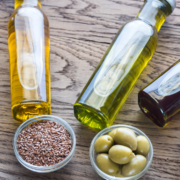Time to Change the Oil!
 We’ve lived with messages promoting eating low-fat or fat free foods for decades. Saturated fats seem to have drawn the majority of disparaging remarks, and many doctors continue to echo the theory that they should be avoided, despite many studies disproving the idea.
We’ve lived with messages promoting eating low-fat or fat free foods for decades. Saturated fats seem to have drawn the majority of disparaging remarks, and many doctors continue to echo the theory that they should be avoided, despite many studies disproving the idea.
Would you like to feel free to consume foods containing fat without fear that you will get fat? Read on, and I will share what fat sources are beneficial, what to avoid, and how to ensure that they are able to be used properly for fuel in your body.
The majority of fats that are consumed in the Standard American Diet are inflammatory vegetable oils and trans fats. These are the oils you want to change – to edit out of your diet. Check your pantry and throw out any foods that have “hydrogenated” in the ingredient list, along with corn, canola, safflower, etc. that are packaged in clear bottles – think Wesson and Crisco. The heat of frying turns oils to trans fats. Vegetable oils cause greater inflammation with an overload of Omega 6, and the trans fats cause blockages by hardening your cell membranes.
Saturated fats have been given a bad rap, often because studies were conducted with insufficient amounts of Omega 3 fats, in which case the saturated fats make platelets stickier (causing blockages to develop) and increase insulin resistance, leading to risk of Type 2 diabetes.
Yet when consumed in conjunction with healthy Omega 3 fats, saturated fats have the opposite effects. They are part of every cell membrane in our body, and they are good sources of fuel for energy that don’t cause the blood sugar swings that carbs do.
Once you clean out your pantry, what type of oils should you stock? Extra virgin olive oil (cold pressed, packaged in a dark bottle), extra-virgin coconut oil, and cold-pressed walnut oil are very good places to start.
For saturated fat, look for organic or grass-fed butter and dairy foods, grass-fed beef and other sustainably raised meats. Combine these with good sources of Omega 3 fats such as fatty, wild-caught fish (mackerel, herring, salmon, sardines, trout), freshly ground flaxseeds, raw pumpkin seeds, sesame or chia seeds, hemp oil, and free-range eggs. And don’t forget to include nuts like almonds, walnuts, pecans and macadamia.
Do you feel relieved to hear that fat is not the no-no you once thought it was? I realize that what I have shared requires a significant mindset change; however, I believe that changing your oil will increase your energy level, reduce your cravings, curb your hunger and reset your hormones to help your body burn fat more efficiently. Don’t forget to increase your consumption of Omega 3 and saturated fats, while also decreasing your consumption of grain-based carbs.
Give it a try and let me know how your body responds!



Great, thanks for sharing this article.